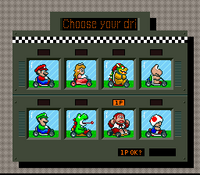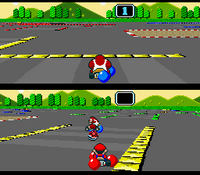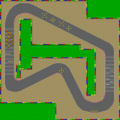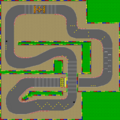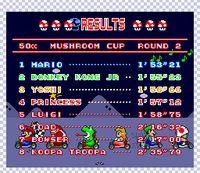Super Mario Kart: Difference between revisions
No edit summary |
|||
| Line 241: | Line 241: | ||
*''[[Mario Kart 7]]'': [[Mario Circuit 2]] and [[Rainbow Road (SNES)|Rainbow Road]] return as retro tracks. Also, the rival system returned in this game. | *''[[Mario Kart 7]]'': [[Mario Circuit 2]] and [[Rainbow Road (SNES)|Rainbow Road]] return as retro tracks. Also, the rival system returned in this game. | ||
*''[[Super Mario 3D World]]'': [[Mount Must Dash]] is based on Mario Circuit from this game. | *''[[Super Mario 3D World]]'': [[Mount Must Dash]] is based on Mario Circuit from this game. | ||
*''[[Mario Kart 8]]'': [[Donut Plains 3 (course)|Donut Plains 3]] returns as a retro track. Also the Coin item returns with the same function as it did in this game. | |||
==Gallery== | ==Gallery== | ||
Revision as of 09:54, April 20, 2014
Template:Redirectshere Template:Infobox Super Mario Kart is a racing game for the Super Nintendo Entertainment System released in 1992 and re-released in 1996 as a Player's Choice title. It was also released in Japan on June 9, 2009; in United States on November 23, 2009; and on April 2, 2010 in Europe and Australia as a Virtual Console title. It is the first game in the Mario Kart series and the game that set precedents to the kart racing style of video games.
Characters
As well as the eight playable drivers, various other Mario series characters appear in Super Mario Kart. Thwomps, Piranha Plants, Monty Moles, and Cheep-Cheeps are enemies that serve as obstacles in certain tracks and Boos appear in the background of other tracks, as well as serving as a usable item.
As stated in the Super Mario Kart manual, Lakitu is the owner of the Super Mario Kart Race Track, and as such, he oversees all races. He holds up the starting signal and various other signs and for the price of two Coins, he also uses his fishing rod to lift any fallen drivers back onto the racetrack.
Button controls
SNES
- Accelerate, Rocket Start
- Use items, stop Item Roulette
- Pause/Select
- Switch view
 - Change option during the Menus/Steer
- Change option during the Menus/Steer- Switch view
- Brake
/
- Drift
Modes of play
Mario Kart GP
The Mario Kart GP is the main mode for Super Mario Kart. Here, players can race against seven other opponents in a five-course cup. The four best drivers will receive Driver Points for placing in the top four. First place gives the player nine points, second gets six, three points for third and only one for fourth. If players get fifth or below, they can try again using one of three limited lives. If they get it four times, the mode is over. A single extra life was earned by placing the same position three times. The maximum score in a GP cup is forty-five. The three best drivers will move on to the award ceremony where they can receive their trophies. Third place gives the player a bronze trophy, second gives them silver and gold for the winner. Each race is five laps long. If the player wants more of a challenge, he or she could highlight his or her character and press the and
buttons at the same time. Their character will be permanently small until the player presses these buttons again.
Match Race
In this two-player mode, players can race against each other. The player who crosses the finish line after five laps wins the race. Hazards will also be placed on the track to add to the challenge.
Time Trial
In this single-player mode, players can get the fastest time within the required number of laps. The best lap time and race time is recorded after all of the laps are played.
Battle
In this mode for two people, players can battle against each other with balloons. To pop them, the player must hit their opponent with an item. The Item Panels will automatically restock after all of them have been used. Each player gets three balloons to begin the battle with and the first person to pop all the other players' three balloons wins the battle.
Drivers
Super Mario Kart has eight available drivers, divided into statistically identical pairs of two. These four categories have no official name, but are referred in the manual as different classes. Later Mario Kart titles categorize characters into weight classes to organize their stats.
|
|
|
|
Courses
Racing courses
- Mushroom Cup
- SNES Donut Plains 1.png
- SNES Ghost Valley 1.png
- SNES Bowser Castle 1.png
- Flower Cup
- SNES Choco Island 1.png
- SNES Ghost Valley 2.png
- SNES Donut Plains 2.png
- SNES Bowser Castle 2 map.png
- SNES Mario Circuit 3 map.png
- Star Cup
- SNES Koopa Beach 1.png
- SNES Choco Island 2.png
- SNES Vanilla Lake 1.png
- SNES Bowser Castle 3 map.png
- SNES Mario Circuit 4.png
- Special Cup
- SNES Donut Plains 3.png
- SNES Koopa Beach 2.png
- SNES Ghost Valley 3.png
- SNES Vanilla Lake 2.png
- SNES Rainbow Road.png
Battle courses
- BC1SNES.png
- BC2SNES.png
- BC3SNES.png
- BC4SNES.png
Items
Rivals
Super Mario Kart has a different rival system from the rest of the series; the rivals contain one very fast driver, one fast driver, one medium driver, one slow driver and three very slow drivers. It is notable that when one of the three slower drivers gets hit, that kart will keep its place, while when one of the faster cars gets shot, it will usually resume its previous place very quickly unless unable to catch up fast enough before the race ends. For this reason, the drivers (except the human racer) will (if unaffected) always finish in the exact same order. Also if the player tries to hit an opponent a majority of the time, they jump over the item.
The rivals for each driver are always the same, the list will be in the order the line up for the first race. It is possible to change the order if the rivals can't recover their place at the end, (Eg. If someone is playing as Luigi and Yoshi finishes last, Yoshi will then become one of the three slower drivers while everybody takes the next position up)
The rivals are determined by the current points standing, meaning that if Yoshi was still only second to the player, he will boost back to first position from the start.
| Character | Rival Order | ||||||
|---|---|---|---|---|---|---|---|
| Very Fast | Fast | Medium | Slow | Very Slow | |||
| Mario | Donkey Kong Jr. | Princess | Yoshi | Luigi | Toad | Bowser | Koopa Troopa |
| Luigi | Yoshi | Mario | Bowser | Koopa Troopa | Princess | Donkey Kong Jr. | Toad |
| Princess | Bowser | Toad | Mario | Donkey Kong Jr. | Luigi | Yoshi | Koopa Troopa |
| Yoshi | Koopa Troopa | Donkey Kong Jr. | Princess | Bowser | Mario | Toad | Luigi |
| Bowser | Mario | Luigi | Princess | Yoshi | Donkey Kong Jr. | Toad | Koopa Troopa |
| Donkey Kong Jr. | Toad | Bowser | Koopa Troopa | Luigi | Princess | Mario | Yoshi |
| Koopa Troopa | Luigi | Yoshi | Princess | Mario | Bowser | Donkey Kong Jr. | Toad |
| Toad | Princess | Donkey Kong Jr. | Mario | Yoshi | Luigi | Koopa Troopa | Bowser |
Development
Super Mario Kart was born out of the idea of making a two-player racing game following F-Zero, which was exclusively single-player [1]. The prototype initially only featured a generic "guy in overalls". The decision to include Mario characters and concepts was made three to four months in development, when the developers added Mario driving one of the karts because they were curious about how the game would look, and decided that it looked better [1]. The battle mode was implemented because the developers thought it would be a good idea to include a form of one-on-one battles that didn't involving competing for ranks during the races [1].
Beta Elements
- Main article: List of Super Mario Kart beta elements
In addition to the above, a prototype cartridge of the game features several differences, such as the presence of animations on the podium screen when the player ranks 2nd or 3rd place, a music track for Vanilla Lake 1 that does not appear in the final build and a different Battle Course 3 set in Choco Island.
Reception
Super Mario Kart met with very favorable reviews. The game was placed 32nd in the 100th issue of Nintendo Power's "100 best Nintendo games of all time" in 1997.[2]. In the book, Guinness World Records: Gamer's Edition for 2009, Super Mario Kart was placed as the #1 best console game. The game was placed 33rd in the 200th issue of GameInformer's "Top 200 Games of all Time" in December 2009. The game was awarded the Most Critically Acclaimed Mario Kart Game by Guinness Book of World Records Gamer's Edition 2009 - 2014.
Staff
- Main article: List of Super Mario Kart staff
References to other games
- Super Mario Bros.: The Lost Levels: The computer-controlled Toad and Peach are able to throw Poison Mushrooms, which are not usable by the player.
- Super Mario World: Several sound effects from this game are reused, for example, the music in the Bowser's Castle levels is very similar from the final boss in this game. Most of the races take place on Dinosaur Land. Also, sprites such as the Lakitu bear a resemblance to their Super Mario World sprite.
References in later games
- Mario Kart: Super Circuit: All twenty of the courses appeared in this game, but all of their track hazards have been removed, Item Boxes are at different places than where ? Panels laid and some tracks changed a little. The music for all tracks is redone for the Game Boy Advance.
- Mario Kart DS: Mario Circuit 1, Donut Plains 1, Koopa Beach 2, and Choco Island 2 all return to this game
- Mario Kart Wii: Ghost Valley 2 and Mario Circuit 3 return as retro tracks and Battle Course 4 returns as a retro battle stage.
- Mario Kart 7: Mario Circuit 2 and Rainbow Road return as retro tracks. Also, the rival system returned in this game.
- Super Mario 3D World: Mount Must Dash is based on Mario Circuit from this game.
- Mario Kart 8: Donut Plains 3 returns as a retro track. Also the Coin item returns with the same function as it did in this game.
Gallery
Media
- Main article: List of media from Super Mario Kart
Glitches
- Main article: List of glitches in Super Mario Kart
Names in other languages
Trivia
- In the Japanese version of Super Mario Kart, every character has a winning animation that involves a bottle of champagne. Bowser and Peach drink champagne in their said animations, which goes against Nintendo of America's policy on the depiction of alcohol, as it was considered inappropriate for younger children. Instead, they just toss and catch the bottles in the Western versions.
- In the manual, the picture for Mario Circuit 1 is upside down.
- In the manual, Karts were incorrectly spelled as "Carts" in the section about the remaining Karts that indicate the player's remaining chances before getting a Game Over.
- This is the only game in the Mario Kart series to have 5 courses per cup, as opposed to 4 in later games (not counting All Cup Tour in Mario Kart: Double Dash!!.
- If the player has 99 coins and picks up another one, the coins reset to 0.
- There is a prototype cartridge that belongs to a customer with some differences from the final. [3]
- Rainbow Road is the only course in the game that does not have a number after its name.
- This is the only Mario Kart game where Wario and Donkey Kong do not appear.
References
- ^ a b c Iwata Asks: Mario Kart Wii (accessed March 22 2012)
- ^ http://www.gamekult.com/communaute/forum/voirmessage.html?foid=13000909, retrieved 6/4/2009
- ^ http://www.digitpress.com/forum/showthread.php?121546-Super-Mario-Kart-prototype
Template:MK Players Template:Mariogames
